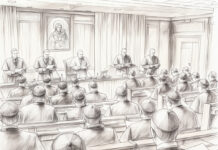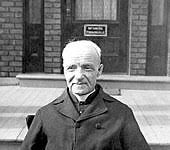“I am the way, the truth, and the life” ~ John 14:6
Dietrich von Hildebrand’s The Dethronement of Truth is a collection of three essays written at different points in his illustrious career. The title essay was published in 1943, but is even more relevant today. Hildebrand clearly understood that Truth, which is the supreme goal of reason, had been savagely dragged from its throne by that ancient and most destructive molester of truth and morals called Relativism. Hildebrand rightly detected that both the Nazis and the Communists were the great molesters of truth in modern times. Both Germany and Russia enthroned not Truth, but the State, as the arbiter of all values. It matters not whether a thought is true or false, but whether it conforms to the values officially held by the State. The twentieth was the century in history that the pursuit of truth had been turned so radically into the pursuit of propaganda. Even should the State blatantly contradict itself, its contradictions were to be embraced without question. The reign of propaganda is necessary to counter truth because the voice of truth always resonates greater than a lie. Thus, truth must be suppressed not only by the deceits of totalitarian propaganda, but by a kind of terrorism that instills fear in the public mind. “Believe as we say, do as we say, or you will lose your job and your freedom and die!” People who tell the truth never have to threaten other people this way. Truth is buttressed and justified by the light that shines forth from it. People love the truth if they are able to love at all. People who do not know the truth are people of the lie who are content to live in their darkness because it does not require them to think but only to obey their masters with the assurance that they will not be whipped for doing so.
The Assault upon Truth
Christ told us that his truth would make us free. But we must pay for that freedom by following his way. Above all, He taught us the innate dignity of every soul. Hildebrand cites the historical moment when that truth and freedom began to wane.
Since the Renaissance, various liberal theories have stripped the human person of his true nobility as the image of God. First, immortality was denied to the person, then freedom of will…. Some saw the human being as a bundle of meaningless sensations, others saw him as a more highly developed animal. The practical consequences of this devaluation of the person were never drawn. A certain reverence for the dignity of the person, his inalienable rights and his freedom of opinion lived on, even though in reality such things logically presuppose the Christian concept of the human person.
Perilous Democracy
Tyrannical governments are not alone in promoting the demise of truth telling. Democracies by their very nature can fail to understand that egalitarianism might give rise to an insidious sabotage of truth telling. Why is this? Because, as Hildebrand puts it, the particularly precious value of democracy is the notion of equality. That goal is so intensely pursued that it colours every aspect of society, and especially of social justice. The idea that no one is above the law, that no one person has rights that all do not share, is so pervasive that it is hard to escape the conclusion that all opinions are equal and equally to be respected, not because all opinions are true, but because “I have a right to my opinion, and who is to say your opinion is better than mine. That’s un-American!” So it follows that because every opinion is equal, every opinion, even the ones that are self contradictory, are to be accorded respect and legitimacy. Thus, not truth, but equality, becomes the criterion for deciding whether an opinion accords with reality. This way of thinking is difficult to refute in a wholly democratic society because people are not trained to think logically. Rather, every opinion is held to be equal to every other opinion. The right to hold a false opinion is guaranteed in a democracy, but there is no corresponding right to claim that a false opinion is as good as a true one. We see the fallacy here also with morals in a democracy. One should never say “My morals are as good as yours,” when the speaker is decidedly evil and the other is clearly good.
Truth is likewise dethroned in a democracy when it is accepted that the majority have it and the minority do not. It is often true that swimming with the stream is so much easier than swimming against the stream. The worship of majority (and mob) rule can be catastrophic, both in the case of truth and in the case of morals. We see this in presidential elections, for example. The person elected to the highest office in the land can be a person who is willfully blind to truth or subject to many voters who are likewise blind. The person who truly should be elected to office can sometimes be thwarted by counters of ballots who willfully give a false count.
“Progressive” truth?
Yet another fallacy peculiar to modern times is that modern times are the best of times. Are they really? Because things change, does it follow that they should constantly change, and that they should change for the better? Truth is often a victim of such policy. Wasn’t it Chesterton who wisely refuted the doctrine of progress when he noticed that everything has “improved” except intellect? Truth, which reason is drawn to, cannot either change or improve. Truth is a fixed entity. Our approach to truth can change and can improve, as when we sharpen our thinking skills by, say, reading a book on logic. Again, we might think something is true, and later, by more careful discernment, discover it is false. That too can be progress. But truth in its own nature cannot be twisted out of shape and reformed into something better than itself, though we might time and again get a better grasp on truth.
“Subjective” truth
Some of that truth-twisting is done by the subjective or imaginative side of the brain. Modernists, on the one hand, assert the (ironically) absolute relativism of truth. Nothing is to be taken as fact, but rather as postulate (a given). Thus God, the soul, immortality, etc. are not to be taken as fact, but as postulates (assumed realities) required to support any viable ethical system. On the other hand, this kind of reasoning vaguely resembles that of the physician who tells us that the surgery done was objectively correct in every detail, but the the patient died. God, the soul, and immortality are in truth subjectively alive, but in truth objectively dead. This is pragmatism run amok. It is easily corrected by observing that anyone maintaining the relativism of morality, upon confronting an enormously evil act, will be very quick to condemn it as objectively evil.
Truth and Psychoanalysis
Certainly since Sigmund Freud psychology has chosen not to dwell so much on the truth of a proposition, so much as on the reason for holding it. If we know more about the person holding such and such a truth, we can infer why the person holds it. For example, Freud never bothered to prove or disprove God’s existence, but rather to explore the reason why people are through the ages so obsessed with God. Here there is no question that the subjective reasons for choosing are far more important than the objective truth of the matter. Freud concluded that religion is for neurotics, people who are fundamentally weak and need to be supported by a higher power. Thus the dethronement of of God and all truths regarding religion is accomplished. Does Freud ever think to ask himself why he found it necessary to dethrone the truth of religion, and more precisely the truth of God? Why could it not be just as reasonable to assume that Freud’s conflicted feelings about his own father, a known sexual pervert, are the root cause of his rejection of God the Father?
But if God is Truth, the rejection of God is the rejection of Truth. God sustains His Truth in us so long as we do not refuse that Truth. Once we reject Him, we invite every possible falsehood into our lives, and especially those falsehoods that make it easier to live by our own will rather than God’s. It is therefore not surprising how we notice the release of so many demons into the modern world. Though moderns might deny their existence, they prove their existence everywhere, and they are multiplied endlessly as the supernatural grace of religion is removed from our lives and replaced with the worship of the world, the flesh, and the devil.
Dealing with the Demonic
This demonic dethronement of Truth must be met by dethroning the Father of Lies. There will be some who say it is too late or too little to affirm over and over the old classical truths that have guided western civilization. Hildebrand cites Goethe’s formula for dealing with the demonic: “Error finds ceaseless repetition in deed, for which reason must one never tire of repeating the truth in words.” Over and over again and again it must be pointed out to the relativists that when they presuppose the non-existence of objective truth, they are also in that very moment presupposing that their denial of objective truth is itself an objective truth. Again, when the pragmatists says that truth is never objective but only useful, it must be pointed our again and again that this very statement is offered as an objective truth, not a useful one.
Offering his tribute to the philosophical systems of Thomas Aquinas and Aristotle, Hildebrand reminds us that we should not be slave bound to those systems (which can always be supplemented with new insights) while at the same time recognizing that as systems they are far and away the most satisfactory ones because the truths they espouse are generally consistent with each other, unlike the many modern philosophical systems that cannot abide consistency and are chronically contradicting themselves and each other. Consistency is another attribute of truth that has been dethroned in modern times, and the world seems to revel in its opposite: inconsistency, as the following example will show.
Postscript: Approach to the Gates of Hell
Fifty years ago it would have been unimaginable to anyone that a half century hence the Catholic Church in Germany would become a perfect illustration of the modern dethronement of truth. Well, perhaps not so surprising. It has been four centuries since Martin Luther, a German priest, had sought to dethrone the truths of the Catholic Church in his time. In today’s instance, we hear that the German bishops’ “Synodal Way” has voted overwhelmingly for same-sex blessings and for a revised wording in the Catholic Catechism regarding homosexuality. As one brave German, Cardinal Gerhard Muller, has put it, for traditional Catholics this is “a time of tribulation and psychological terror.”
When the sexual revolution began in the 1960s there were, no doubt, assurances by the radical left that there would be a limit as to how far the revolution could go. Certainly bishops and theologians at that time did not even begin to hint that the teachings of the Church on homosexuality were in doubt. The Old Testament lesson of Sodom and Gomorrah (Genesis 19) and St. Paul’s condemnation of sodomy in his epistles to the Romans (1:26-27) and to the Corinthians (1 Corinthians 6:9-10) together with traditional Catholic theology, made it clear that sodomy is a mortal sin. That today it should suddenly be argued to allow same-sex marriages to be blessed by priests is surely an assault on Truth for which bishops will imperil the saving of their own souls. In truth, bishops will have adopted the position that the Church must conform to the World, when Christ made it very clear that the world was to bend its knee to him or perish, as did the citizens of Sodom and Gomorrah. And this is why, when he was addressing the cities who had rejected his own preaching, Jesus searched for a dreadful comparison and came up with a very good one: “I tell you, it will be more tolerable for the land of Sodom on the day of judgment than for you.” (Matthew 11:24)
Moreover, the long term result of such heresy is to open the floodgates for many new heresies, for if the Church once decides that it has wrongly preached on sexual morality, why should it not have wrongly preached on anything and everything it has ever said, as enemies of the Church would like us to think? Many disheartened Catholics could shake that dust from their feet and flee the Catholic village as Lot and his family fled Sodom. Indeed, it is not clear there are a sufficient number of good bishops who are loyal enough to obey Truth upon His throne and speak bravely the truths that must be spoken. We might remember what Archbishop Fulton Sheen once said: in America it will not be the clergy who will save the Catholic Church … it will be the laity.
What he meant by that in practical terms is anyone’s guess.











